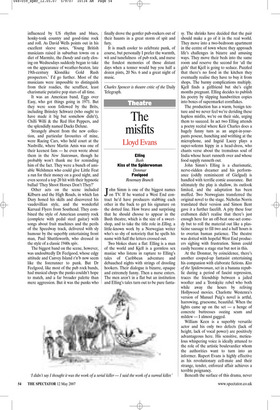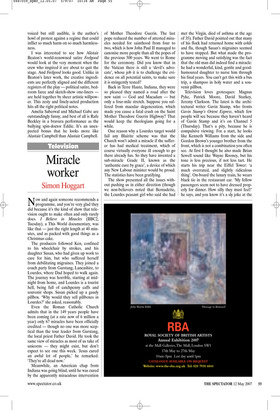Theatre
The misfits
Lloyd Evans
Elling Bush Kiss of the Spiderwoman Donmar Feelgood Rosemary Branch John Simm is one of the biggest names on TV. If he wanted a West End contract he’d have producers stabbing each other in the back to get his signature on the dotted line. How brave and surprising that he should choose to appear in the Bush theatre, which is the size of a sweetshop, and to take the title role in Elling, a little-known work by a Norwegian writer who’s so shy of notoriety that he spells his name with half the letters crossed out.
Two blokes share a flat: Elling is a man of the world and Kjell is a gormless sex maniac who listens in rapture to Elling’s tales of Caribbean adventure and debauched nights with strings of drooling hookers. Their dialogue is bizarre, opaque and extremely funny. Then a nurse enters. The men aren’t in a flat but an institution and Elling’s tales turn out to be pure fanta sy. The shrinks have decided that the pair should make a go of it in the real world. They move into a two-bedroom apartment in the centre of town where they approach life’s challenges in bizarre and amusing ways. They move their beds into the same room and reserve the second for ‘all the girls’ that Kjell is going to seduce. Puzzled that there’s no food in the kitchen they eventually realise they have to buy it from shops. The barmy complications multiply. Kjell finds a girlfriend but she’s eight months pregnant. Elling decides to publish his poetry by slipping handwritten copies into boxes of supermarket cornflakes.
The production has a warm, benign texture and we never feel we’re deriding these hapless misfits, we’re on their side, urging them to succeed. In act two Elling attends a poetry recital where Keir Charles does a hugely funny turn as an angst-in-yourpants poseur, hunching and writhing at the microphone, and Ingrid Lacey plays a super-solemn hippy in a head-dress, who chants verse about the tremulous soul of India whose heart runneth over and whose food supply runneth out.
John Simm’s Elling is a charismatic, nerve-ridden dreamer and his performance (oddly reminiscent of Gielgud) is handled with terrific comic assurance. But ultimately the play is shallow, its outlook limited, and the adaptation has been muffed. Two Norwegians transferred the original novel to the stage. Nicholas Norris translated their version and Simon Bent gave it a further facelift. A pity these four craftsmen didn’t realise that there’s just enough here for an off-beat one-act comedy but to roll the material out like a plasticine sausage to fill two and a half hours is to overtax human patience. The theatre was dotted with hopeful West End producers sighing with frustration. Simm could easily become a stage star but not in this.
At the Donmar, by coincidence, there’s another cooped-up fantasist entertaining his companion with elaborate fictions. Kiss of the Spiderwoman, set in a banana republic during a period of fascist repression, traces the friendship between a jailed woofter and a Trotskyite rebel who both while away the hours by reliving Hollywood movies. Charlotte Westenra’s version of Manuel Puig’s novel is artful, harrowing, gruesome, beautiful. When the lights came up on the set — a henge of concrete buttresses oozing scum and mildew — I almost gagged.
William Keen is a superbly versatile actor and his only two defects (lack of height, lack of vocal power) are positively advantageous here. His sensitive, meticulous whispering voice is ideally attuned to the role of the artistic boulevardier whom the authorities want to turn into an informer. Rupert Evans is highly effective as his revolutionary cell-mate and their strange, tender, enforced affair achieves a terrible poignancy.
Beneath the surface of this drama, never voiced but still audible, is the author’s howl of protest against a regime that could inflict so much harm on so much harmlessness.
I was interested to see how Alistair Beaton’s world-renowned satire Feelgood would look at the very moment when the crew who inspired it are about to quit the stage. And Feelgood looks good. Unlike in Beaton’s later work, the creative ingredients are perfectly aligned and the different registers of the play — political satire, bedroom farce and sketch-show one-liners are held together by sheer artistic willpower. This zesty and finely-acted production hits all the right political notes.
Amelia Saberwal and Michael Gabe are outstandingly funny, and best of all is Rafe Beckley in a bravura performance as the bullying spin-doctor Eddie. It’s an unexpected bonus that he looks more like Alastair Campbell than Alastair Campbell.











































































 Previous page
Previous page